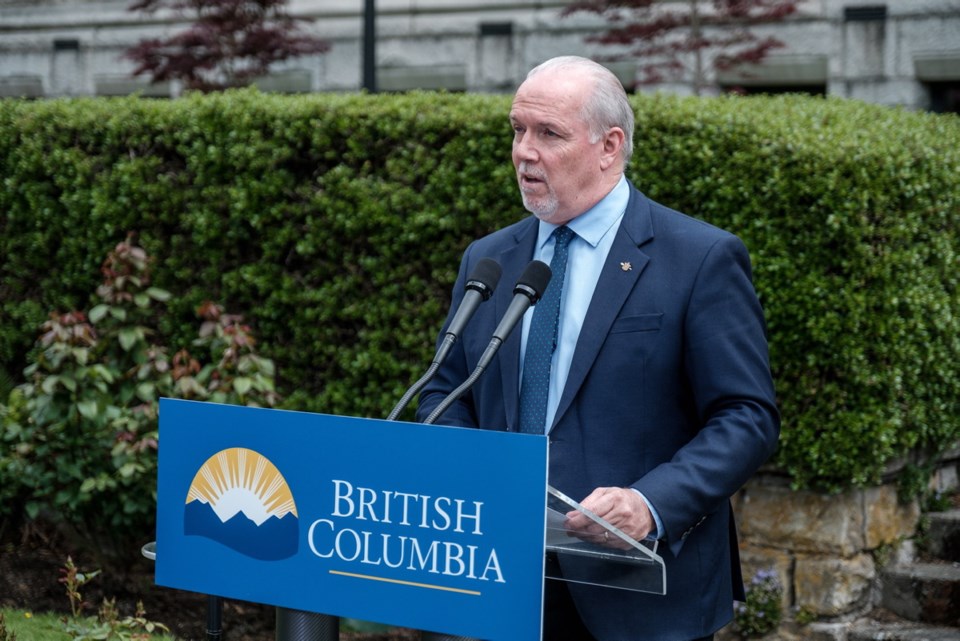B.C. Premier John Horgan says there will be an impasse if B.C.’s plan to reopen domestic tourism province-wide is met with plans to close communities.
On Tuesday, the Nuu-Chah-Nulth Tribal Council, representing 14 First Nations along 300 kilometres of west Vancouver Island coast, voted unanimously to restrict non-essential entry to its lands — including provincial and federal parks — unless several assurances around testing are put in place.
“As Nuu-chah-nulth, we must take extraordinary measures that go far above and beyond provincial and federal health guidelines, to protect our communities and members from this devastating disease, COVID-19,” Mariah Charleson, vice-president of the tribal council, said in a statement.
This comes as the province struggles to reopen domestic tourism province-wide amid resistance from remote, rural and First Nations communities concerned for the safety of their residents.
“Vancouver Island hasn’t had an active case in over a month and I think that should give some comfort to the challenge,” said Horgan. “But I absolutely understand their anxiety and that anxiety is not just with Indigenous peoples; there are communities in British Columbia that are still uneasy about inviting and welcoming people from away.
“But if we’re going to talk about tourism on one hand and isolation and closing communities with the other, we’re going to have an impasse,” Horgan said during a weekly news conference at the B.C. legislature on Wednesday.
The plan for reopening businesses and tourism is facing challenges.
On April 27, Dr. Bonnie Henry, provincial health officer, said First Nations communities such as Haida Gwaii have the authority to restrict visitors and make those decisions for their communities.
Last week, the premier said opening tourism on a regional basis as opposed to province-wide, as mandated in the restart plan, would not be feasible.
On Tuesday, the tribal council said in a resolution that access to First Nations lands from Barkley Sound to Point-No-Point “shall remain restricted” to Huu-ay-aht residents and essential service providers until provisions, including prioritized testing for residents of remote and Indigenous communities, screening of non-residents, and contact tracing and communications protocols are in place.
The council said it is advising the provincial and federal government that the Nuu-Chah-Nulth’s consent to reopening to visitors is “contingent on each of the factors set out in this resolution being fully addressed; and only when each Nuu-Chah-Nulth Nation determines that all conditions are fulfilled and their consent given.
“The Nuu-chah-nulth Nations affirm that the protection of the health of the Nations’ members and citizens is of the highest priority, and must be assured before recreational and non-essential economic activities are expanded.”
Horgan, whose riding includes Port Renfrew in Nuu-Chah-Nulth territory, said the province has been working co-operatively with Indigenous peoples from the beginning of the pandemic as well as with the First Nations Health Authority.
The province’s approach has been to find the best way to provide tests for protecting public health and protecting Indigenous communities, “but also providing opportunities for economic activity so people can pay their bills and put food on the table,” Horgan said Wednesday.
On May 22, Indigenous Relations Minister Scott Fraser, NDP MLA for Mid Island-Pacific Rim, said information-sharing “tables” would be held as the province moves forward with restart plans to take into account the unique needs of Indigenous and remote communities.
The first information table was on June 3 and the second was on Wednesday.
The premier, provincial health officer and B.C. Health Minister Adrian Dix have discouraged people from travelling outside their own communities, but that is soon to change as Phase 3 of the province’s restart plan begins.
Nuu-chah-nulth Tribal Council President Judith Sayers said the council strongly opposes the opening of the Canadian border for the duration of the pandemic and until Nuu-chah-nulth leaders advise otherwise.
“The risk is simply too high and we are not willing to put the health of our members to the side simply to benefit the economy,” Sayers said in a statement.
Last week, the premier said a regional strategy “doesn’t work when it comes to international tourism and as for domestic tourism we are going to do everything we can with an aggressive promotion campaign in the days ahead to encourage people to visit every part of B.C. if they’ve got the time to do so.”
Reopening tourism will be gradual and cautious, it will not be the flick of a switch, said the premier, and it will be dependent on transmission rates of the virus remaining low.



